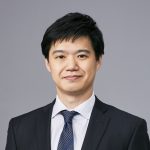touchPANEL DISCUSSION First-Line EGFR TKIs in NSCLC: where are we headed in 2020?
Watch renowned clinical specialists in lung cancer discuss the latest developments in the first-line use of TKIs in EGFR NSCLC with our touchPANEL DISCUSSION, with internationally renowned expert faculty discussing the use of TKIs in first line and beyond and consider what the findings may mean for your own clinical practice.

Prof. Ross Camidge
University of Colorado Cancer Center, Denver, CO, USA
CHAIR
Panelists:
Introduction
Prof. Ross Camidge chairs a discussion with Dr Yashusi Goto, Prof. Byoung Chul Cho and Prof. Niels Reinmuth on recent data and issues surrounding the use of TKI inhibitors in EGFR+ NSCLC.
1/4 Next ChapterBarriers to accessing biomarker testing
What did we learn about 3rd-generation EGFR TKIs in 2019? Focus on clinical trial- and real-world data for 3rd-generation EGFR TKIs in EGFR+ NSCLC from 2019
2/4 Next ChapterWhat are possible approaches to treatment sequencing for EGFR+ NSCLC?
How should clinicians approach treatment sequencing for EGFR+ NSCLC in 2020? Focus treatment sequencing in EGFR+ NSCLC, and how our increasing experience in this area may impact treatment options for patients
3/4 Next ChapterWhat did we learn about 3rd‐generation EGFR TKIs in 2019 and how will it affect our patients?
How important is access to biomarker testing? Focus on the central role of biomarker testing for initial treatment selection in EGFR+ NSCLC, and for the identification of T790M following resistance, and how increasing awareness of, and access to, testing could improve outcomes for patients
4/4 Leave FeedbackOverview & Learning Objectives
Overview
Watch renowned clinical specialists in lung cancer discuss the latest developments in the first-line use of TKIs in EGFR NSCLC with our touchPANEL DISCUSSION, with internationally renowned expert faculty discussing the use of TKIs in first line and beyond and consider what the findings may mean for your own clinical practice.
Prof. Ross Camidge chairs a discussion with Dr Yashusi Goto, Prof. Byoung Chul Cho and Prof. Niels Reinmuth on recent data and issues surrounding the use of TKI inhibitors in EGFR+ NSCLC.
This activity is intended for oncologists and healthcare professionals globally.
This touchPANEL DISCUSSION was recorded in November 2019.
Learning Objectives
After watching this touchPANEL DISCUSSION, you should be able to:
- Recall recent data for 3rd-generation EGFR TKIs in first-line EGFR+ NSCLC and describe real-world evidence
- Describe treatment sequencing and the paradigm for therapy of EGFR+ NSCLC
- Discuss issues related to biomarker testing, including timing and access
Faculty & Disclosures

Prof. Ross Camidge
University of Colorado Cancer Center, Denver, CO, USA
Ross Camidge is a Director of Thoracic Oncology at the Joyce Zeff Chair in Lung Cancer Research University of Colorado Cancer Center, Denver, USA. Prof. Camidge’s main areas of clinical and research interest are thoracic malignancies and developmental therapeutics. The discoveries he and his team have made have changed the standard of care for the treatment of lung cancer multiple times.
Advisory role/ad hoc advisory boards/consultations for AstraZeneca, Takeda, CBT Pharmaceuticals, Daiichi-Sankyo (ILD adjudication committee), Abbvie, Achilles, BeyondSpring, Apollomics (standing SRC), 14ner (standing SRC), Archer, EMD Serono, Helssin, BMS, Eli Lilly, Medtronic, Arrys/Kyn, Regeneron, Hengrui, Hansoh (SRC), Bio-Thera (DSMB), Ribon, Blueprint, Roche/Genentech, Inivata, Genoptix, Mersana Therapeutics, Roche/Genentech, Lycera, Revolution Med. Research funding from Abbvie, AstraZeneca, BMS, Hansoh, Lycera, Medimmune, Merck, Pfizer, Phosplatin, Roche/Genentech, Seattle Genetics, Symphogen, Takeda

Prof. Niels Reinmuth
Asklepios Lung Clinic in Munich-Gauting, Munich, Germany
Niels Reinmuth has been leading the Thoracic Oncology Department at the Asklepios Lung Clinic in Munich-Gauting, Germany since 2016. Prof. Reinmuth’s main interests are targeted therapies in non-small-cell lung cancer, new approaches in small-cell lung cancer and modern therapies in malignant pleural mesothelioma, as well as translational research related to predictive markers.
Advisory and speaker services for AstraZeneca, Bristol-Myers Squibb, Boehringer-Ingelheim, Hoffmann-La Roche, Lilly, MSD, Novartis, Pfizer, and Takeda.

Prof. Byoung Chui Cho
Yonsei Cancer Center, Yonsei University College of Medicine, Seoul, Korea
Byoung Chul Cho is Professor, Division of Medical Oncology, and Chief, Lung Cancer Center, Yonsei Cancer Center, Yonsei University College of Medicine, Seoul, Korea. Prof. Cho’s interests are head and neck surgery, oncology, chemotherapy and transoral robotic surgery and internal medicine
Research funding from Novartis, Bayer, AstraZeneca, MOGAM Institute, Dong-A ST, Champions Oncology, Janssen, Yuhan Ono, Dizal Pharma, MSD Consulting role: Novartis, AstraZeneca, Boehringer-Ingelheim, Roche, BMS, Ono, Yuhan, Pfizer, Eli Lilly, Janssen, Takeda and MSD. Stock ownership with TheraCanVac Inc, Gencurix Inc. and Bridgebio therapeutics. Royalties from Champions Oncology

Dr Yasushi Goto
National Cancer Center Hospital, Tokyo, Japan
Yasushi Goto is a Senior Consultant at Division of Thoracic Oncology, National Cancer Center Hospital, Tokyo, Japan. Dr Goto’s research interests include translational medicine approaches for thoracic malignancies.
Consulting or advisory role for AstraZeneca, Boehringer Ingelheim, Chugai, Eli Lilly, Glaxo Smith Kline, Guardant Health, Novartis, Merck Sharp & Dohme, Pfizer and Taiho Pharmaceutical. Speaker’s bureau attendee for AstraZeneca, Boehringer Ingelheim, Bristol Myers Squibb, Chugai, Eli Lilly, Merck Sharp & Dohme, Novartis, Ono Pharmaceutical, Pfizer, Shionogi Pharma and Taiho Pharmaceutical. Research Funding from AbbVie, Bristol Myers Squibb, Chugai, Dai-ichi Sankyo, Eli Lilly, Kyorin, Novartis, Ono Pharmaceutical, Pfizer and Taiho Pharmaceutical.

Register to touchONCOLOGY for FREE
- Peer-reviewed journals and expert opinions
- Interactive CME and e-learning modules
- Video conference highlights

